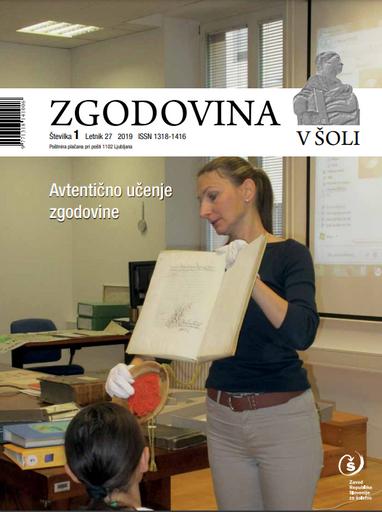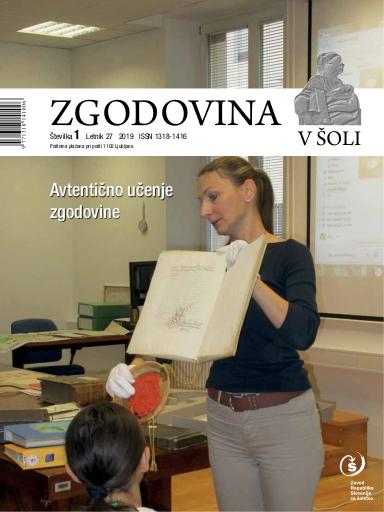/
Serijske publikacije
/
Zgodovina v šoli
Učenje zgodovine zunaj učilnic - obisk spominskega prostora nekdanjega koncentracijskega taborišča Ljubelj jug

Avtor(ji):VIlja Lukan
Soavtor(ji):Vilma Brodnik (ur.), Tine Logar (lekt.), Ensitra prevajanje, Brigita Vogrinec s. p. (prev.)
Leto:01. 01. 2019
Založnik(i):Zavod RS za šolstvo, Ljubljana
Jezik(i):slovenščina
Vrst(e) gradiva:besedilo
Ključne besede:koncentracijsko taborišče, vzgoja za mir, memorialni prostor, didaktični pristopi, interpretacija težke dediščine, concentration camp, education for peace, memorial, didactic approaches, interpretation of a difficult heritage
Avtorske pravice:

To delo avtorja VIlja Lukan je ponujeno pod Creative Commons Priznanje avtorstva-Nekomercialno-Deljenje pod enakimi pogoji 4.0 Mednarodna
Datoteke (1)

Ime:Zgodovina_v_soli_2019_1.pdf
Velikost:3.71MB
Format:application/pdf
Stalna povezava:https://hdl.handle.net/11686/file26230
Opis
The area of the former concentration camp Ljubelj jug, a subdivision of the concentration camp Mauthausen, is the most authentically preserved German concentration camp in present-day Slovenia. Therefore, in interpreting the content to the visitors, preservation of the memorial, its protection and, ultimately, an emphasised ethical aspect play an immensely important role. Since 2014, the memorial has been managed by Tržič Museum, which places a great importance on school group visits, reflecting modern-day schools approach of educating the values of peace to the younger generation. Tržič Museum professionals work to bring history closer to younger generations in a way that is as understandable and as appropriate as possible, which includes the events that took place during World War 2 in Slovenia. For this purpose, they are upgrading and updating the pedagogical programs, using various pedagogical approaches in their tours to present this period of difficult historical events to students in the best way. The awareness and the memory of the events taking place during World War 2 in the Ljubelj area should be kept alive and pointed to through adequate presentation in order to remember them as well as prevent any similar developments in the future. Using appropriate didactic approaches, we can help raise awareness of the values in students as well as emphasise why they are important and why they should be respected and followed. The article focuses on the importance of heritage and gives an example of a tour of the former concentration camp Ljubelj jug with a description of the used pedagogical approaches.
Metapodatki (12)
- identifikatorhttps://hdl.handle.net/11686/45909
- naslov
- Učenje zgodovine zunaj učilnic - obisk spominskega prostora nekdanjega koncentracijskega taborišča Ljubelj jug
- Learning history outside the classroom - a visit to the memorial of the historical concentration camp Ljubelj jug
- avtor
- VIlja Lukan
- soavtor
- Vilma Brodnik (ur.)
- Tine Logar (lekt.)
- Ensitra prevajanje, Brigita Vogrinec s. p. (prev.)
- predmet
- koncentracijsko taborišče
- vzgoja za mir
- memorialni prostor
- didaktični pristopi
- interpretacija težke dediščine
- concentration camp
- education for peace
- memorial
- didactic approaches
- interpretation of a difficult heritage
- opis
- Območje nekdanjega koncentracijskega taborišča Ljubelj jug, podružnice koncentracijskega taborišča Mauthausen, je najpopolneje ohranjeno avtentično območje nemškega koncentracijskega taborišča na tleh današnje Slovenije. Zaradi tega so ohranjanje spominskega prostora, njegova zaščita in konec koncev poudarjen etični vidik pri interpretaciji vsebine obiskovalcem izjemno pomembni. Od leta 2014 s spominskim prostorom upravlja Tržiški muzej, ki daje velik poudarek obisku šolskih skupin, saj je danes pomembna vzgoja za vrednote miru za mlajšo generacijo. Strokovni delavci Tržiškega muzeja si prizadevajo, da bi mlajšim generacijam čim bolj razumljivo in primerno približali zgodovino in jim predstavili dogodke v Sloveniji med drugo svetovno vojno. V ta namen nadgrajujejo in posodabljajo pedagoške programe in pri vodenju uporabljajo različne pedagoške pristope, s katerimi bi težke teme iz zgodovine učencem kar najbolj približali. Treba se je zavedati dogodkov, ki so se pod Ljubeljem zgodili med drugo svetovno vojno, opozarjati na njih in z ustrezno predstavitvijo ohranjati spomin na zgodovino, da se v prihodnosti kaj takega ne bi pozabilo in v kakršni koli obliki ponovilo. Z ustreznimi didaktičnimi pristopi lahko pri učencih ozavestimo vrednote, poudarimo, zakaj so pomembne in zakaj jih je treba spoštovati ter se po njih ravnati. Prispevek obravnava pomen dediščine in predstavlja primer vodenja po območju nekdanjega koncentracijskega taborišča Ljubelj jug z opisanimi pedagoškimi pristopi.
- The area of the former concentration camp Ljubelj jug, a subdivision of the concentration camp Mauthausen, is the most authentically preserved German concentration camp in present-day Slovenia. Therefore, in interpreting the content to the visitors, preservation of the memorial, its protection and, ultimately, an emphasised ethical aspect play an immensely important role. Since 2014, the memorial has been managed by Tržič Museum, which places a great importance on school group visits, reflecting modern-day schools approach of educating the values of peace to the younger generation. Tržič Museum professionals work to bring history closer to younger generations in a way that is as understandable and as appropriate as possible, which includes the events that took place during World War 2 in Slovenia. For this purpose, they are upgrading and updating the pedagogical programs, using various pedagogical approaches in their tours to present this period of difficult historical events to students in the best way. The awareness and the memory of the events taking place during World War 2 in the Ljubelj area should be kept alive and pointed to through adequate presentation in order to remember them as well as prevent any similar developments in the future. Using appropriate didactic approaches, we can help raise awareness of the values in students as well as emphasise why they are important and why they should be respected and followed. The article focuses on the importance of heritage and gives an example of a tour of the former concentration camp Ljubelj jug with a description of the used pedagogical approaches.
- založnik
- Zavod RS za šolstvo
- datum
- 01. 01. 2019
- tip
- besedilo
- jezik
- Slovenščina
- jeDelOd
- pravice
- licenca: ccByNcSa
